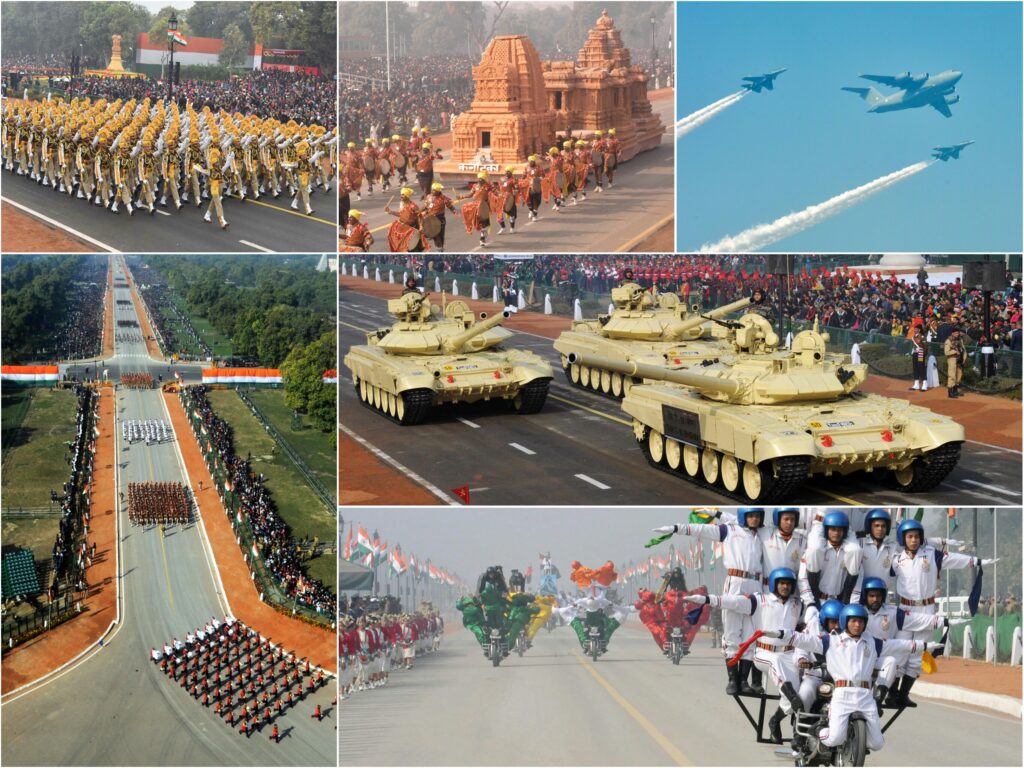The guest of honor at the Republic Day parade of 2023, Abdeh Fatah al-Sisi was the leader of the Egyptian army and security minister before he took control from the democratic leader Md Morsi after the crime in 2013.

As Egyptian President al-Sisi becomes the first guest of Republic Day after a two-year hiatus caused by the pandemic, The Indian Express examines how India chooses its main guests for Republic Day.
who is al-Sisi?

The chief guest of the 2023 Republic Day parade, Abdeh Fatah al-Sisi was Egypt’s military leader and security chief before he took over from the democratically elected dictator Md Morsi after he was overthrown in 2013. He won elections in -next in 2014 to the economic development board. Meanwhile, the president has received mixed responses, while critics point to Egypt’s current economic crisis and the suppression of the violence of opposition voices as reasons for concern. When he arrives in January next year, al-Sisi will be the first Egyptian leader to honor the ceremony.
Why is it a great honor to be the guest of Republic Day of India?

Although it is like any state visit by a high-ranking foreign leader, due to the grandeur and importance of this event in India, it is the highest honor that the country bestows on a visitor in terms of the constitution. .
The chief guest is among the many ceremonial events that, over time, have become an important part of the celebration and its preparation. They receive a guard of honor ceremony at the Rashtrapati Bhavan followed by a reception hosted by the President of India in the evening. They laid wreaths at Rajghat, in honor of Mahatma Gandhi. There was a reception in their honor, a lunch hosted by the president and a call from the vice president and the foreign minister.
Ambassador Manbir Singh, a former Indian Foreign Service officer who served as chief of protocol between 1999 and 2002, said the chief guest’s visit was full of metaphors – “it shows who The prince’s hospitality is like participating in the pride and joy of India, and it shows. the friendship between two people represented by the President of India and the guest.” This representation becomes a powerful tool to create and modify the relationship between India and its host countries, and has great political and diplomatic importance.
There is a lot of thought behind choosing the host of the Republic Day Parade, and the process begins almost six months before the event. Spokesperson Manbir Singh told The Indian Express that Ministry of External Affairs (MEA) officials are taking all kinds of considerations before issuing the invitation. The most important thing is the nature of the relationship between India and the country concerned. Being invited to be the chief guest in the Republic Day Parade is the highest sign of friendship between India and the host country. India’s political, commercial, military and economic policies are important factors in the decision, while the MEA wants to use the opportunity to strengthen its relations with the host country in all these areas.
Another factor in history that played a role in the choice of the main host was the alliance with the Non-Aligned Movement (NAM) which began in the late 1950s, early 1960s. The NAM is an international political organization of countries that have been de-colonised to escape the Cold War and support each other in their country-building journey. The first guest of honor at the parade in 1950 was President Sukarno of Indonesia, one of the five NAM members along with Nasser (Egypt), Nkrumah (Ghana), Tito (Yugoslavia) and Nehru (India). Al-Sissi’s call evokes the history of NAM and India’s close relationship with Egypt since 75 years.
What will happen when the MEA submits its selection?
After careful consideration, the MEA seeks the approval of the Prime Minister and the President in the matter. If the MEA gets the go-ahead, it will work. The Indian embassy in the affected country is trying to discreetly ensure the presence of the chief guest. This is very important because it is not common for the leaders of the country to have active goals and commitments that cannot be avoided. This is also why WEA does not choose just one option but a list of possibilities. Understanding is very important because there has been no invitation issued by India. Once this process is completed and the candidate is finalized, the communication between India and the country of the player is next. MEA regional units are working on practical issues and agreements. The Chief of Protocol handles the details of programs and weapons. The Chief of Protocol shares the detailed schedule of the Republic Day tour with his counterpart in the host country. This process must be followed with precision.
The organization of the visit includes the Government of India, the state government and the foreign head may visit the local government concerned.
Could something go wrong during the visit?
Like any visit of a top foreign leader, there are many emotional aspects to the visit of the Republic Day guest. For this reason, there is always the possibility that things will not go according to plan, something organizers should prepare for in advance. Medical problems with VIPs can cause delays. Untimely rain can spoil the party. Organizers prepare and adapt the impossible for different situations so that on D-Day, everything goes smoothly.
However, at times, problems occur. Writing for the Indian Express, Ambassador Singh recounted an incident where the ADC of the chief Republic Day guest tried to accompany the guest for the inspection of the guard of honour. “But in our practice, only three security guards accompany the visitor, and the ADC insists that the staff on site will catch the animal.”
Big picture of the guest visit
Ambassador Singh pointed out that the chief guest for Republic Day is chosen based on the interest of other countries and the availability of the guest – so the natural statement is that the guest should be happy and satisfied. very comfortable.
India knows that the media team accompanying the visitor will inform their country about all aspects of the visit. To promote and promote good relations, it is important that the host country sees the visit as a success and that its president has received all respect and honor.
In today’s world, eye protection is very important, programs and measures take this into account, Ambassador Singh emphasized. He said that various visiting dignitaries and their representatives in New Delhi praised the Indian ceremony and the values it provides. Indian hospitality reflects its culture, tradition and history. A Republic Day guest of honor is a ceremonial honor given to a country’s president, but its significance goes beyond formal ceremonies. Such a visit can open new opportunities and enhance India’s interests in the world.
A List Of Republic Day Chief Guests
The List includes am impressive list of world leaders
1950 – President Sukarno, Indonesia
1951 – King Tribhuvan Bir Bikram Shah, Nepal
1952 and 1953 – No Chief Guest
1954 – King Jigme Dorji Wangchuck, Bhutan
1955 – Governor General Malik Ghulam Muhammad, Pakistan
1956 – Two guests: Chancellor of the Exchequer Rab Butler, United Kingdom; Chief Justice Kotaro Tanaka, Japan
1957 – Minister of Defence Georgy Zhukov, Soviet Union
1958 – Marshal Ye Jianying, China
1959 – Duke of Edinburgh Prince Philip, United Kingdom
1960 – Chairman Kliment Voroshilov, Soviet Union
1961 – Queen Elizabeth II, United Kingdom
1962 – Prime Minister Viggo Kampmann, Denmark
1963 -King Norodom Sihanouk, Cambodia
1964 – Chief of Defence Staff Lord Louis Mountbatten, United Kingdom
1965 – Food and Agriculture Minister Rana Abdul Hamid, Pakistan
1966 -No Chief Guest
1967 -King Mohammed Zahir Shah, Afghanistan
1968 -Two guests: Chairman Alexei Kosygin, Soviet Union; President Josip Broz Tito, Yugoslavia
1969 – Prime Minister Todor Zhivkov, Bulgaria
1970 – King Baudouin, Belgium
1971 – President Julius Nyerere, Tanzania
1972 – Prime Minister Seewoosagur Ramgoolam, Mauritius
1973 – President Mobutu Sese Seko, Zaire
1974 – Two guests: President Josip Broz Tito, Yugoslavia; Prime Minister Sirimavo Bandaranaike, Sri Lanka
1975 – President Kenneth Kaunda, Zambia
1976 – Prime Minister Jacques Chirac, France
1977 – First Secretary Edward Gierek, Poland
1978 – President Patrick Hillery, Ireland
1979 – Prime Minister Malcolm Fraser, Australia
1980 – President Valéry Giscard d’Estaing, France
1981 – President Jose Lopez Portillo, Mexico
1982 – King Juan Carlos I, Spain
1983 -President Shehu Shagari, Nigeria
1984 – King Jigme Singye Wangchuck, Bhutan
1985 – President Raúl Alfonsín, Argentina
1986 – Prime Minister Andreas Papandreou, Greece
1987 – President Alan Garcia, Peru
1988 – President J. R. Jayewardene, Sri Lanka
1989 – General Secretary Nguyen Van Linh, Vietnam
1990 – Prime Minister Anerood Jugnauth, Mauritius
1991 -President Maumoon Abdul Gayoom, Maldives
1992 -President Mário Soares, Portugal
1993 – Prime Minister John Major, United Kingdom
1994 – Prime Minister Goh Chok Tong, Singapore
1995 – President Nelson Mandela, South Africa
1996 -President Fernando Henrique Cardoso, Brazil
1997 -Prime Minister Basdeo Panday, Trinidad and Tobago
1998 -President Jacques Chirac, France
1999 – King Birendra Bir Bikram Shah, Nepal
2000 – President Olusegun Obasanjo, Nigeria
2001 – President Abdelaziz Bouteflika, Algeria
2002 -President Cassam Uteem, Mauritius
2003 – President Mohammed Khatami, Iran
2004 -President Luiz Inácio Lula da Silva, Brazil
2005 -King Jigme Singye Wangchuck, Bhutan
2006 – King Abdullah bin Abdulaziz al-Saud, Saudi Arabia
2007 -President Vladimir Putin, Russia
2008 – President Nicolas Sarkozy, France
2009 – President Nursultan Nazarbayev, Kazakhstan
2010 – President Lee Myung Bak, South Korea
2011 – President Susilo Bambang Yudhoyono, Indonesia
2012 – Prime Minister Yingluck Shinawatra, Thailand
2013 – King Jigme Khesar Namgyel Wangchuck, Bhutan
2014 – Prime Minister Shinzo Abe, Japan
2015 – President Barack Obama, United States
2016: -President François Hollande, France
2017 – Crown Prince Mohammed bin Zayed Al Nahyan, United Arab Emirates
2018 -Ten Chief Guests, Heads of ASEAN States
Sultan Hassanal Bolkiah, Brunei
Prime Minister Hun Sen, Cambodia
President Joko Widodo, Indonesia
Prime Minister Thongloun Sisoulith, Laos
Prime Minister Najib Razak, Malaysia
President Rodrigo Duterte, Philippines
Prime Minister Lee Hsien Loong, Singapore
Prime Minister Prayut Chan-o-cha, Thailand
2019: President Cyril Ramaphosa, South Africa
2020: President Jair Bolsonaro, Brazil


